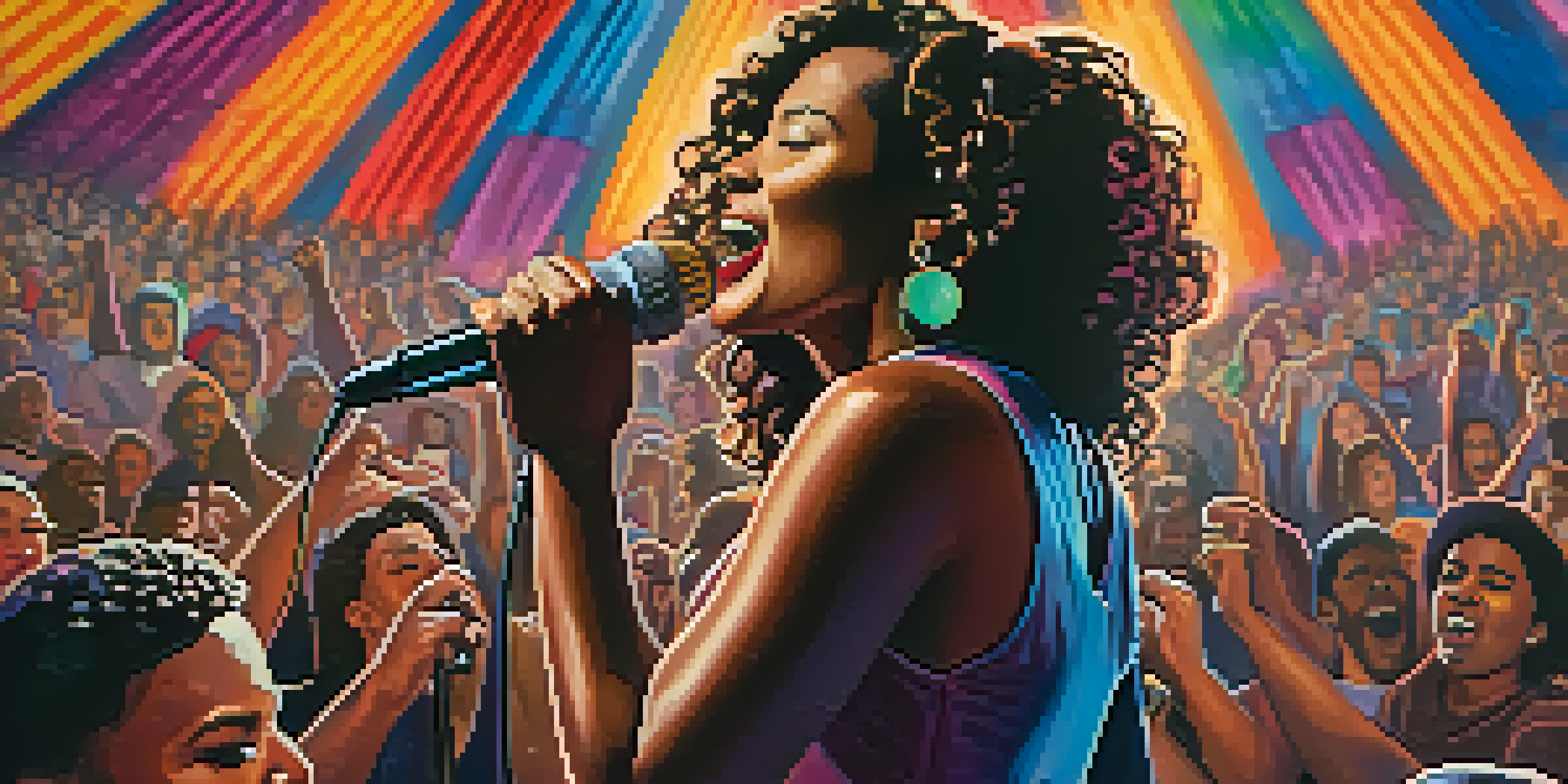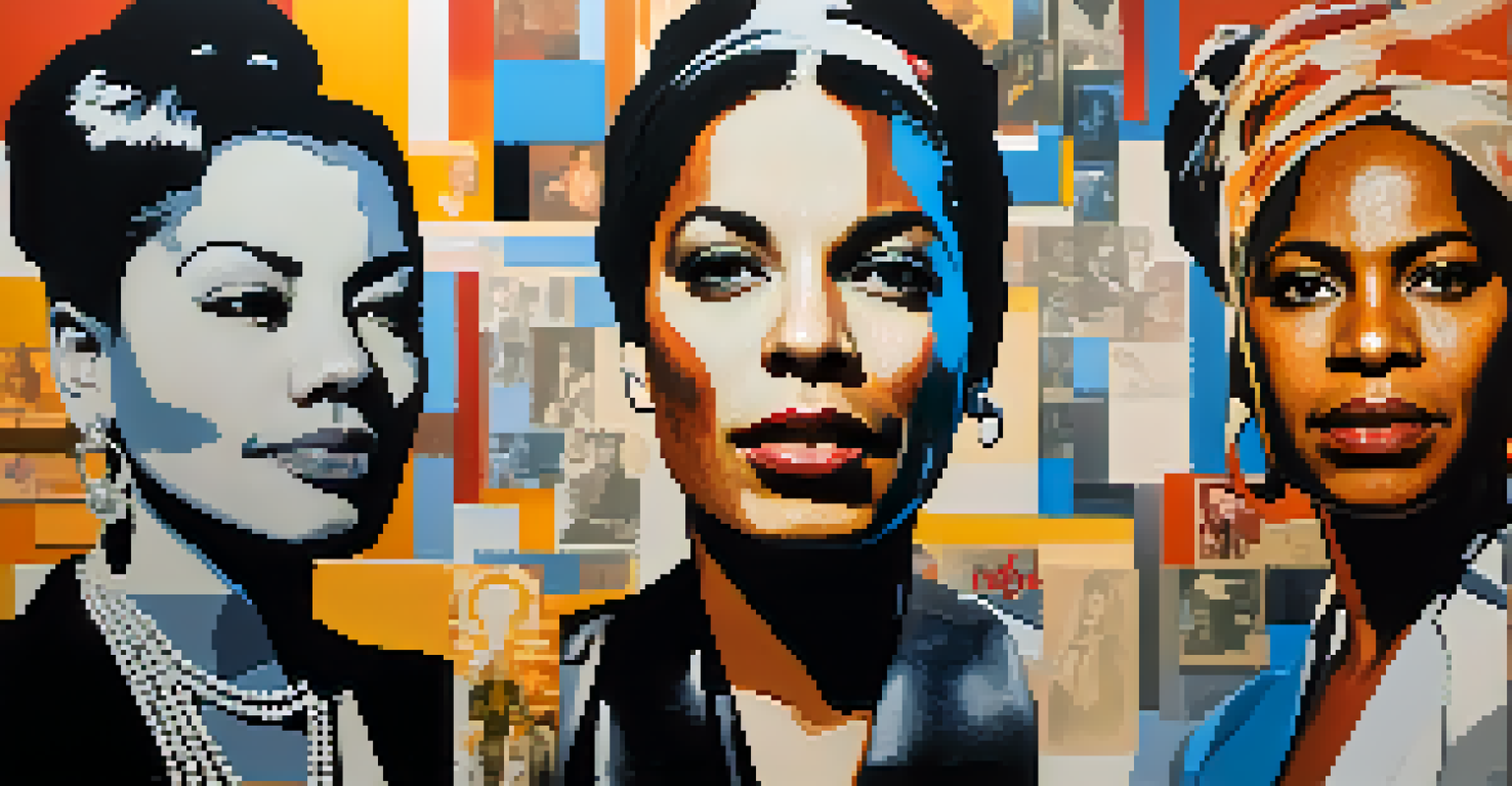Women in Music: Voices of Political Change and Resistance

The Power of Music as a Political Tool
Music has long been a medium for political expression and change. From folk songs that fueled the civil rights movement to punk anthems that challenged the status quo, women have played a crucial role in using their voices to inspire action. Artists like Joan Baez and Nina Simone not only entertained but also educated and mobilized audiences against injustice.
Music can change the world because it can change people.
Through their lyrics and performances, these women have crafted narratives that resonate with the struggles of marginalized communities. They have transformed personal experiences into powerful anthems that speak to collective grievances. This intersection of art and activism reminds us that music can be a catalyst for social change.
Moreover, the emotional depth of music allows for a unique connection, making political messages more relatable and impactful. When women take center stage, they not only elevate their own stories but also amplify the voices of those often overlooked in mainstream narratives.
Iconic Figures Leading the Charge
Throughout history, several women have emerged as iconic figures in the political music landscape. Artists like Billie Holiday, with her haunting rendition of 'Strange Fruit,' brought attention to the horrors of racism and lynching in America. Similarly, artists like Aretha Franklin and Madonna have used their platforms to address issues such as women's rights and LGBTQ+ equality.

These women not only created unforgettable music but also sparked conversations that transcended the music scene. Their influence can be seen in how they challenged societal norms and expectations, paving the way for future generations of female artists. They showed that a voice can change the world, one song at a time.
Women Drive Music and Activism
Throughout history, women have used music as a powerful tool for political expression and social change.
Additionally, as these artists became symbols of resistance, their work inspired many others to take up the mantle. They demonstrated that music can be a form of protest, a way to confront oppression, and a means to demand change.
The Role of Contemporary Artists in Activism
Today, contemporary female artists continue to harness the power of music for political activism. From Beyoncé's 'Formation' to Taylor Swift's outspoken stance on social issues, modern musicians are more than entertainers; they are activists. Their music often addresses topics like racial injustice, gender equality, and mental health, reflecting the complexities of today's societal landscape.
The power of music can make a difference in the world, and it comes from the heart.
These artists leverage social media to amplify their messages, reaching millions instantly. This digital age allows them to connect directly with fans, fostering a sense of community around shared values and causes. The impact of their activism extends beyond music, inspiring movements and encouraging listeners to engage in social issues.
Furthermore, collaborations among artists across genres and backgrounds demonstrate a united front against injustice. These partnerships often create powerful tracks that resonate with diverse audiences, showing that solidarity is essential for meaningful change.
Challenges Faced by Women in Music
Despite their growing influence, women in music still face significant challenges. Gender inequality persists in the industry, with women often receiving less recognition and fewer opportunities compared to their male counterparts. These disparities can hinder their ability to make an impact, both musically and politically.
Additionally, women artists frequently encounter scrutiny regarding their appearance and personal lives, detracting from their artistic achievements. This scrutiny can discourage many talented individuals from pursuing careers in music or speaking out on important issues. It’s a stark reminder of the societal pressures that continue to exist, even in creative fields.
Contemporary Artists Inspire Change
Modern female artists leverage their platforms and social media to advocate for pressing social issues.
However, many women are pushing back against these challenges, fostering new platforms and communities that uplift female voices. By supporting one another, they are creating a more inclusive environment where their contributions can shine, ultimately leading to greater political impact.
The Legacy of Women in Music Activism
The legacy of women in music as agents of political change is profound and enduring. From the soulful ballads of the past to the empowering anthems of today, their influence is woven into the fabric of music history. They have set the stage for future artists to use their platforms for activism, showing that every voice matters.
This legacy is not only about the music created but also the movements inspired. Many current artists credit their predecessors as sources of inspiration, highlighting the importance of mentorship and community. This connection across generations reinforces the idea that activism in music is a continuous journey rather than a destination.
As we look to the future, the impact of these women will undoubtedly continue to shape both the music industry and the broader landscape of social change. Their contributions remind us that music is a powerful tool for resistance, capable of igniting passion and fostering solidarity.
Global Perspectives on Women in Music
Women in music are not just making waves in Western cultures; their influence spans the globe. From Fela Kuti's daughters carrying on his legacy in Nigeria to the rise of K-pop idols speaking out on social issues, women around the world are using their music to challenge political and social norms. These global perspectives enrich the conversation about resistance and activism in music.
Artists like Malala Yousafzai and her collaborations with musicians highlight how music can transcend borders and create a shared language for change. The universal themes of struggle and empowerment resonate deeply, fostering connections among diverse audiences. This cross-cultural exchange illustrates the power of music as a unifying force.
Challenges Persist for Women Creators
Despite their influence, women in music continue to face significant challenges, including gender inequality and scrutiny.
Moreover, the rise of digital platforms allows for greater visibility and collaboration among women in music worldwide. This interconnectedness promotes solidarity, enabling artists to amplify each other's messages and work together toward common goals.
The Future of Women in Music Activism
As we look to the future, the role of women in music activism seems poised for growth and evolution. With more female artists stepping into leadership roles within the industry, the potential for political change through music is vast. The increasing acknowledgment of gender equality in music opens doors for innovative collaborations and initiatives that can further amplify women's voices.
The advent of technology continues to reshape how music is created and shared, providing new avenues for activism. Platforms like TikTok and Instagram allow artists to engage directly with fans, creating a space for dialogue around pressing issues. This immediacy can galvanize support for causes, making activism a more integral part of the music experience.

Ultimately, the future holds promise as women in music embrace their power to inspire change. By continuing to share their stories and advocate for justice, they ensure that their voices remain central to the conversation about resistance and political change.